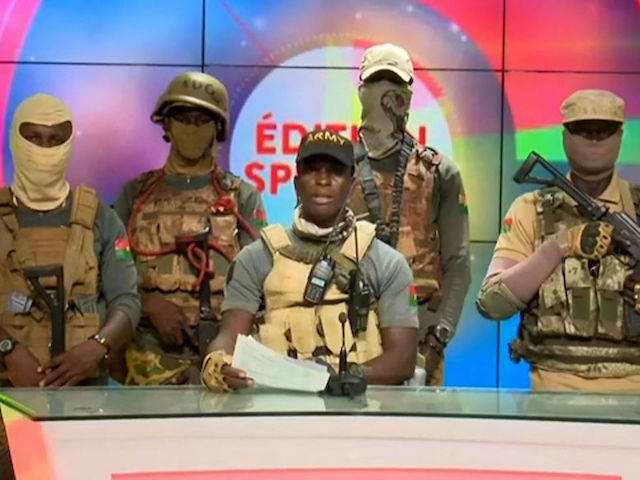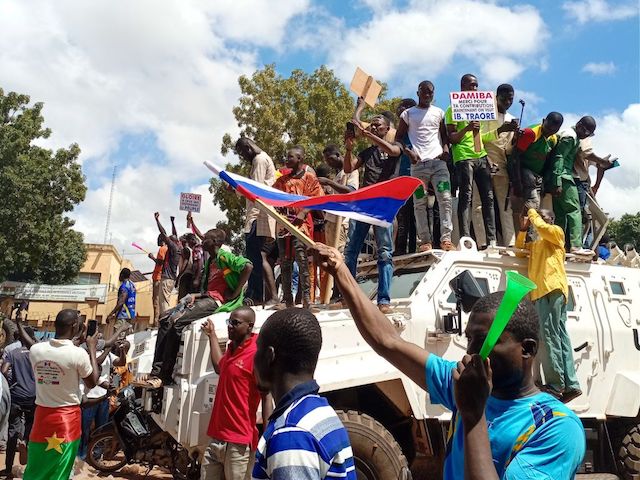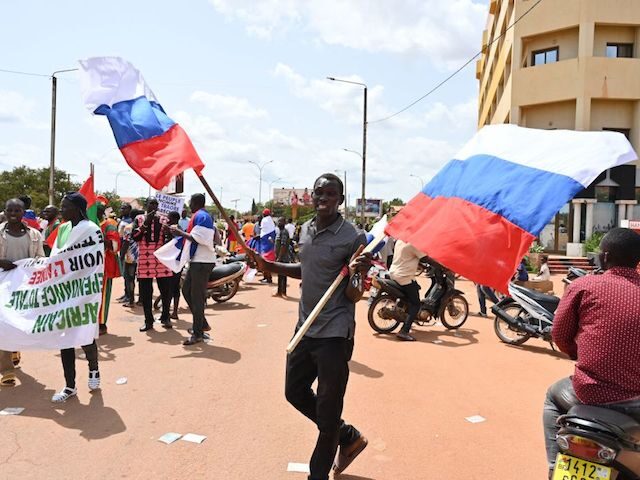Burkina Faso President Paul-Henri Sandaogo Damiba resigned on Sunday, wiping out the government of the West African nation in the second coup of the year and bringing it closer to Russia’s dangerous orbit.
Damiba was himself a junta leader who seized power from President Roch Marc Christian Kabore in a January coup. He immediately dissolved Kabore’s administration and the national legislature, suspended the constitution, and announced the formation of a new military-controlled ruling party called the Patriotic Movement for Safeguard and Restoration, commonly referred to by its French acronym MPSR.
The MPSR described its takeover as “non-violent,” but heavy gunfire was heard in the national capital of Ouagadougou, photos of blood-splattered vehicles were posted to the Internet, and Kabore claimed the coup leaders tried to assassinate him. The junta kept Kabore under house arrest until April. He recently announced a political comeback by forming a new party with former security minister Simon Compaore.
Damiba was deposed on Friday in a fresh coup led by Captain Ibrahim Traore as the Burkina Faso military split into feuding, and potentially warring, camps over the question of whether their country should remain aligned with France, or embrace Russia as its new patron.

In this video grab taken from footage of AFPTV the new self-proclaimed leader of the military junta ruling Burkina Faso, Captain Ibrahim Traoré (C), parades in the streets of Ouagadougou and hails the cheering crowd on October 2, 2022. (IDRISSA OUEDRAOGO,ADAMA OUEDRAOGO/AFPTV/AFP via Getty Images)
The military, and much of the public, turned against Kabore because he was ineffective at controlling Islamist insurgents, who have been spreading chaos through the Sahel ever since former U.S. President Barack Obama invaded Libya and destabilized the region in 2011. Burkina Faso began to suffer increasingly violent terrorist attacks in 2016. Kabore was accused of failing to provide both adequate security and a stable economy, giving the jihadis a large pool of unemployed and disaffected youth to recruit from.
Damiba was overthrown for the same reasons and in almost exactly the same manner: a few days of chaos, gunfire, and explosions in Ouagadougou, followed by a gang of masked soldiers appearing on television to inform the public their president had been deposed.

This video grab taken from a video broadcasted on October 2, 2022 by the national television of Burkina Faso shows sub-lieutenant Jean-Baptiste Kabre (C), reading a statement surrounded by members of the military claiming to have taken power on September 30, 2022 in Ouagadougou. (Radiodiffusion Télévision du Bur/AFP via Getty Images)
“Faced with the deteriorating situation, we tried several times to get Damiba to refocus the transition on the security question,” said a statement signed by Traore. “Damiba’s actions gradually convinced us that his ambitions were diverting away from what we set out to do. We decided this day to remove Damiba.”
“I go on patrol with my men and we don’t have the basic logistics. In some villages, the trees don’t have leaves because people eat the leaves. They eat weeds. We’ve proposed solutions that will enable us to protect these people, but we are not listened to,” Traore complained to reporters over the weekend.
The new junta said Damiba “offered his resignation in order to avoid confrontations with serious human and material consequences.”
Religious figures and community leaders reportedly brokered a deal between Damiba and Traore in which the latter agreed to meet seven conditions for the deposed president to leave without a fight, including security guarantees for Damiba and his top allies, and a promise that Traore would adhere to a promise of restoring civilian rule within two years that Damiba made to the Economic Community of West African States (ECOWAS).
The military said on Sunday that Traore would remain in power “until the swearing-in of the president of Burkina Faso designated by the nation’s active forces.” No timeline for such a transition to quasi-civilian government was provided.

A protester wearing a Russian flag shows pictures of Mali’s Assimi Goita, Russian President Vladimir Putin and Burkina Faso Ibrahim Traore as he joins other demonstrating against France and the Economic Community of West African States (ECOWAS) whose representatives are expected today in Ouagadougou on October 4, 2022. (ISSOUF SANOGO/AFP via Getty Images)

Supporters of Ibrahim Traore stage a demonstration on October 2, 2022 in Ouagadougou, Burkina Faso. (Stringer/Anadolu Agency via Getty Images)
Damiba recorded a farewell message and wished Traore success on Sunday, then departed for Togo, whose government said on Monday the ousted Burkina Faso president has been granted refuge there.
“Togo, like ECOWAS, welcomes the fact that the spirit of peace has prevailed. The reception of … Damiba is part of this spirit,” Togo’s communications minister Akodah Ayewouadan said on Monday.
Damiba’s ouster is a disturbing sign that Burkina Faso under Traore will turn to Russia as its new patron. Traore accused Damiba of being too cozy with France and at one point over the weekend claimed Damiba was plotting to launch a “counteroffensive” against the coup from a French military base. He later recanted this accusation.
France categorically denied the accusation, but there were still violent demonstrations outside the French embassy in Ouagadougou. Many of the demonstrators were waving Russian flags, chanting pro-Russia slogans, and waving signs with messages such as “Together we say no to France!”
“We want cooperation with Russia. We want the departure of Damiba and France,” a protester told Reuters on Sunday, while his associates heaved burning tires at the French embassy.
The UK Guardian on Monday noted Russia wants to build influence across sub-Saharan Africa and covets its mineral resources. Moscow launched a successful influence campaign in neighboring Mali in 2020.
In return, the Russians can offer brutal military assistance through its notorious Wagner Group, a mercenary outfit run by Yevgeny Prigozhin, a strong supporter of Russian leader Vladimir Putin. Prigozhin applauded the coup and hailed Traore as a “truly courageous son of the motherland” on Saturday.
A Western official told the Guardian Damiba was ousted because he reneged on promises to ask Russia for help against the Islamists.
“It might have been bringing in advisers, or weapons, or Wagner, or whatever, but it didn’t happen and that was one of the things that wound up his critics in the armed forces,” the Western official explained.

COMMENTS
Please let us know if you're having issues with commenting.